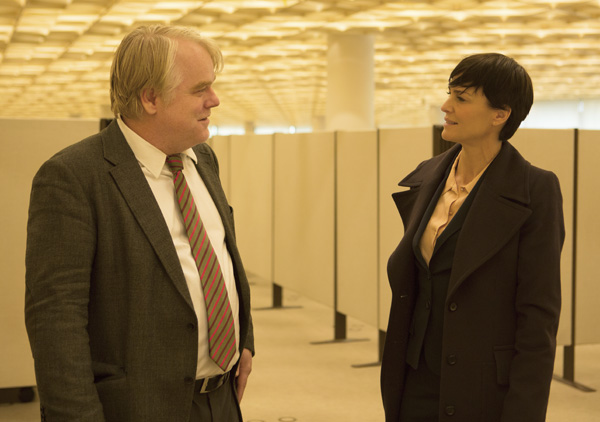“Never again” was the common refrain following September 11, and perhaps nowhere in Europe was it truer than for Hamburg. Based on the book by John le Carré (which, in turn, was loosely inspired by actual events), the film opens with the on-screen statement that more than a decade has passed since Mohamed Atta planned the terrorist attacks of 9/11 in the northern German city and that such an event can never be allowed to repeat itself. Give the events of the last decade, the implications from the start are clearly meant to be chilling, and the film is a searing and provocative, if at times unsubtle, examination of the tactics employed in the war on terror.
The film begins with the entry into the country of Issa Karpov (Grigory Dobrygin), a half-Russian, half-Chechen man in his twenties. Supposedly an escaped jihadist, he attracts interest right away. Günther Bachmann (Philip Seymour Hoffman), head of a secret anti-terror unit that stands in sharp contrast to the more bureaucratic German intelligence agency, and his team quickly identify Issa and set out to determine whether he poses a threat. Issa is taken in by a kindhearted Muslim woman and her son, who put him in touch with Annabel Richter (Rachel McAdams, valiantly attempting a German accent). Richter, a human rights lawyer, wants to help him get asylum, and she fairly oozes well-intentioned but naive idealism.
The quiet, almost brooding Issa is a cipher. He reveals that he was imprisoned in Turkey prior to coming to Hamburg, but not why he was sentenced, and his true intentions remain a mystery. (The painful scars and lacerations on his back are evidence of torture.) He informs Annabel that his father, a terrorist whom he claims to hate and who is now dead, has left him a bank account, with millions of euros, but he feels guilt over claiming the money
Clearly entranced by Issa and his story, Annabel unwittingly leads Günther’s team to Tommy Brue (Willem Dafoe), head of the bank holding the funds, and from there Günther is ready to make his move. But it’s not Issa he’s ultimately after. The “most wanted man” of the film’s title is Dr. Faisal Abdullah, a well-known academic and philanthropist (when we first meet him, he’s smoothly delivering a lecture on the importance of Muslims cooperating with the West). He is suspected of using his charities to funnel money to terrorist organizations. Issa, with his attractive bank account and shady past, provides a way to infiltrate Abdullah and prove the terrorist connections.
Like many before him in the renegade role, Günther has bureaucratic red tape to contend with: the head of Hamburg’s branch of the German intelligence, Dieter Mohr (Rainer Bock), who wants to swoop in and capture Issa. Mohr has little patience for Günther’s under the radar methods—or his overall goals. Günther’s pronouncement that their objective is to make the world a safer place—even if it means offering amnesty to suspects rather than making arrests—is greeted with ill-disguised derision. However, the presence of an American CIA spy, Martha Sullivan (Robin Wright, with the short hairdo viewers will recognize from House of Cards dyed brown), sympathizes with Günther, and may give him a shot at his more nuanced—and effective—approach.
Günther’s strategies quickly escalate from tailing suspects and eavesdropping to far more morally nebulous ones. In a perhaps heavy-handed but effective commentary on anti-terror tactics, cameras are installed in the apartment where Issa is hiding, lending the film a frighteningly voyeuristic tone that should hit home in the wake of the NSA scandal.
The film has a grimy, dark feel to it. Not a slick, high-octane thriller, it’s as down and dirty as the world it portrays, from the opening scenes, a close-up of the sewer, to various tiny, dank offices, apartments, and bars. The few times we’re in fancier digs, there’s a sharp contrast and the implication that the characters associated with these places lack the same authenticity as, say, Günther. Intricately plotted, the movie rarely drags, and though it’s easy to follow, there are enough twists and turns to keep audiences intrigued.
Though A Most Wanted Man doesn’t delve too deeply into Hoffman’s character, it’s hard not to watch the last film he completed prior to his death without feeling a pang. The late actor brings pathos to the role, drawing viewers in to the difficulties of the job he has to do. Günther enjoys an easy camaraderie with young and stylish Irna (Nina Hoss), one of the spies who works with him—though not a relationship that ever strays into romance—and while the focus is always squarely on the plot, it’s hard not to empathize with both him and the rest of his team.
The film does suffer from “fridge logic,” the feeling that viewers experience shortly after watching a TV show or movie that something doesn’t hold up to scrutiny: Why does Günther so desperately need Issa in order to snag Abdullah? With his disregard for conventional methods, Günther could easily send in one of his own people to entrap the possible terrorist. That aside, this is an intriguing and absorbing film, one that doesn’t let up until an explosively devastating finale that will have viewers shaking their heads (“It’s Hamburg, Günther”).







Leave A Comment